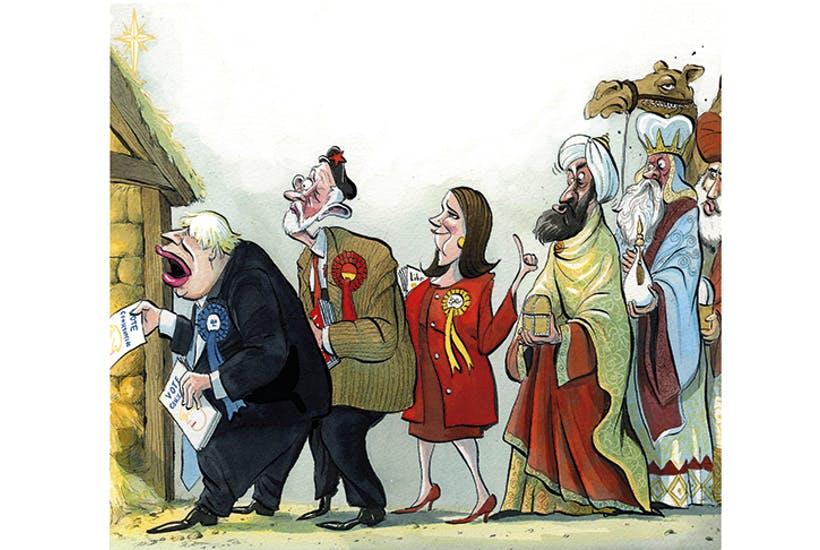In this volatile election, not much is certain about what will happen. But what you can be sure of is that the Spectator will be releasing one – if not more – Coffee House Shots podcast every day. Last night, the Coffee House Shots team took the podcast on the road – not very far, admittedly – down to the Emmanuel Centre in Westminster for a live recording. Fraser Nelson, Katy Balls, and James Forsyth were joined by Matthew Goodwin, Professor of Politics at the University of Kent and author of National Populism: The Revolt Against Liberal Democracy. Tune in here to catch up with the discussion; and if you don’t already, listen to our daily politics podcast here.
On the podcast, Fraser begins with a series of graphs to contextualise how close this election is. Here are those graphs laid out:
This aggregation of polling data shows the plunge of the Brexit party’s popularity when Boris Johnson became Prime Minister.

But this shouldn’t give you that much confidence – compare the 2019 numbers to 2017, where the Conservatives led in the polls throughout the campaign.

And if you catch yourself thinking that Corbyn’s policies are radical or extreme, you’d be surprised at how much national support there are for Corbynomics around the country.

Both parties are promising a fairly generous spending splurge:

Britain’s growth forecast is middle of the pack compared to Germany and France:



Domestically, the British economy overshoots the forecast for jobs growth every year:

So why are there so many jobs? It might have something to do with the increase in average earnings:

But the Corbynista might say this average figure hides what’s really going on at the top and at the bottom. In fact, the lowest paid have experienced the largest real term percentage increases in hourly wages, as shown by this graph:

Fraser points out the rise in minimum wage under the Conservative governments – ‘you couldn’t quite describe these policies as Thatcherite’:

As for Labour’s potential coalition partners, the SNP: after the Brexit vote, the Scottish separatists experienced a big dip in support. That has now caught up to the No campaign, making this election a proxy independence referendum:

This is the UK’s deficit compared to the OECD countries:

If Scotland were to be independent, that graph would look like this:

Fraser asks: if Scotland became independent after Brexit, would it even be able to re-join the EU with deficit levels like that?
And last, this graph is Betfair’s odds on the result of the next election – chances of a Labour majority are low, on 3 per cent. But remember, a hung parliament could be a Labour minority government propped up by the SNP, so the odds of Corbyn being prime minister are still quite high.

To hear more podcasts from the Spectator on issues from politics to religion, literature to lifestyle, search for Spectator Radio on your podcast provider.







Comments